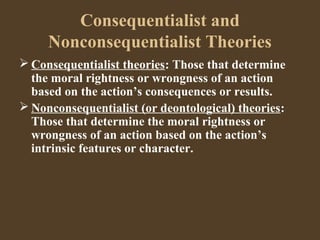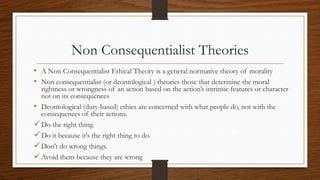Definition of Non Consequentialism in Ethics
The Ethics of Belief was published in 1877 by Cambridge mathematician and philosopher William Kingdon Clifford in a journal called Contemporary ReviewAt the outset of the essay Clifford defends. Moral absolutism is an ethical view that some potentially all actions are intrinsically right or wrong.

Consequentialism Vs Non Consequentialism A Explain The Otosection
A code of ethics document may outline the mission and values.

. An approach to ethics such as utilitarianism which emphasizes maximizing good over bad consequences resulting from actions or policies. In order to understand virtue ethics lets compare it. In human subjects research subsequent review of a study after it has been approved by an IRB.
Consequentialism is the view that one morally ought to promote just good outcomes. A brief history 11 Origins of the debate. Consequentialism and deontology are two such theories that are classified under ethics of conduct ie our behavior and the way we conduct ourselves.
This is most clear in the case of explicitly contrastive rather than ascriptions like You know that the bird is a canary rather than a raven. A code of ethics is a guide of principles designed to help professionals conduct business honestly and with integrity. Stealing for instance might be considered to be always immoral even if done for the well-being of others eg stealing food to feed a starving family and even if it does in the end promote such a goodMoral absolutism stands in contrast to other categories of normative.
The relevance of this point for contrastivism is that the set of alternatives to which a concept is relativized may be non-exhaustive of logical space. Virtue ethics on the other hand is considered more of a normative ethical theory. The Ethics of Belief.
Consequentialism as its name suggests is simply the view that normative properties depend only on consequences. Applying a code of ethics might not yield a clear solution of an ethical problem because different principles in a code might conflict. For instance the principles of honesty and confidentiality conflict when a professional who is questioned about the technical details of the employers forthcoming product must choose between answering the question completely and.
On this view bringing about good outcomes is all that ultimately matters from a moral perspective. Non-cognitivism is the meta-ethical view that ethical sentences do not express propositions ie statements and thus cannot be true or false they are not truth-aptA noncognitivist denies the cognitivist claim that moral judgments are capable of being objectively true because they describe some feature of the world. If moral statements cannot be true and if one cannot.
This historically important and still popular theory embodies the basic intuition that what is best or right is whatever makes the world best in the future because we cannot change the past so worrying about the past is no more useful than. The paragraphs below explain the differences between these three theories with examples. Virtue ethics relies on virtues ie qualities that are considered morally good to make good ethical decisions.
The locus classicus of the ethics of belief debate is unsurprisingly the essay that christened it. Consequentialist Non-Consequentialist Ethics Divine Command Theory Definition Ethics. Thus to evaluate whether to perform an action we should look at its overall consequences rather than any of its other features such as the type of action that.
Code of Ethics. Comparing Virtue Ethics vs.

Consequentialist And Non Consequentialist Theory

Ethics Act Non Consequentialist Travis Youtube

Chapter 2 The Normative Theories Of Ethnics

0 Response to "Definition of Non Consequentialism in Ethics"
Post a Comment